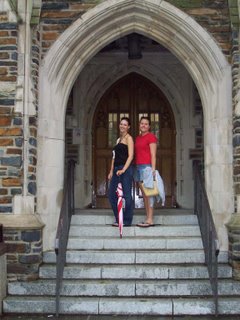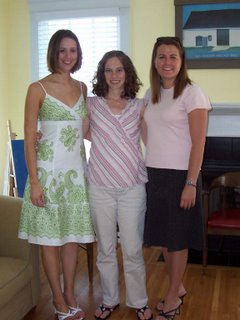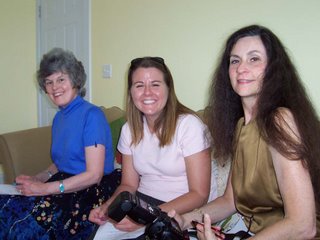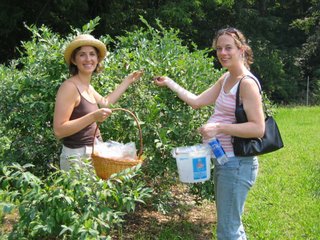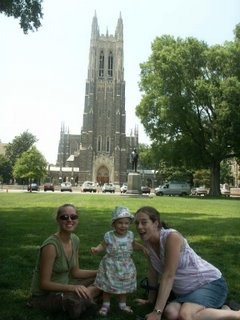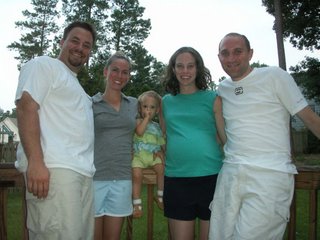A quote by Sigrid Undset who converted to Catholicism:
"By degrees my knowledge of history convinced me that the only thoroughly sane people, of our civilization at least, seemed to be those queer men and women the Catholic Church calls Saints. They seemed to know the true explanation of man's undying hunger for happiness - his tragically insufficient love of peace, justice, and goodwill to his fellow men, his everlasting fall from grace. Now it occurred to me that there might possibly be some truth in the original Christianity.
"But if you desire to know the truth about anything, you always run the risk of finding it. And in a way we do not want to find the Truth - we prefer to seek and keep our illusions. But I had ventured too near the abode of truth in my researches about 'God's friends,' as the Saints are called in the Old Norse texts of Catholic times. So I had to submit. And on the first of November, 1924, I was received into the Catholic Church."
Brian and I want to make a habit of reflecting on the books we read rather than just moving on to the next book or event in our life. Although the task is often difficult to start, I always find it rewarding for both my mind and soul. As I am a little rusty in this area, I figured that something is better than nothing. We'll see who gets their post up first as Brian just finished an Isaac Asimov book.
Kristin Lavransdatter was written by Sigrid Undset, and I would put it in the historical fiction category. It was finished in 1922 and takes place in 14th Century Norway.
First, I read this book twice- once in the older translation and once in the new. During my first reading of the book I was enthralled with the passionate love story between Kristin and Erlend. I was reading as fast as I could to find out what would happen to these characters. I have to admit I often skipped chucks of the book because I wanted to know how things turned out. I actually almost stopped reading the book after Erlend's death because I wondered what else could possibly be as exciting. Also, the older translation of the book was sometimes hard to read, especially when trying to decipher the political views and leaders of the time. I read that the newer translation was easier to read and truer to the original. After reading both translations, I think the newer translation is definitely better. I was able to follow the political events as well as other characters when reading this translation. Granted I had the benefit of having read the book through once, but I still think the newer translation is a better read. Plus you can get the newer copy on Amazon.com for only $16.00!
So how do you start to evaluate and reflect on a 1,100 page book??? Well obviously I can't look into every aspect of the book- especially on a blog! Some interesting comparisons might be Fru Aashild and Kristin Lavransdatter also Ragnfrid; Erlend and Simon; ancient superstitions and folklore vs. Catholicism, etc... I could also explore how Undset uses nature in her novel. You could write a paper on each of these topics. I think what I would rather explore though is the reality of life (or sin) as portrayed in this novel.
I will never forget a talk I heard my freshman year of college. A pastor named Tom Nelson gave a talk on marriage. He basically said that marriage is a sinner marrying a sinner giving birth to sin. He went on to talk about the difficulties that occur in marriage and why girls who have grown up their whole lives waiting for prince charming and thinking that marriage is a fairy tale- need to stop thinking this way (well at least that is what I took away from the talk). This was honestly the first time I ever heard this before. Also in our marriage counseling, Pastor Rick Bourque stated that it was his job during our times together to convince us of how incredibly difficult marriage was so that when we actually were married we would think it wasn't "that bad."
I think Undset is trying to express a similar idea in her book. Kristin and Erlend have an intriguing, passionate romance that blinds them from their sin and the obstacles standing in the way of their perfect life in the garden lasting no more than basically one night.
It was late at night, and the bonfires were mere mounds of glowing embers that grew dimmer and dimmer. Kristin and Erlend stood hand in hand beneath the trees by the garden fence... A remnant of the day's hot, spicy scent wafted toward them, muted and damp with the coolness of the dew. The night was quite dark, the sky hazy gray with clouds above the treetops... Erlend pressed the maiden to him once and asked in a whisper, "You're not afraid, are you Kristin?" Suddenly she vaguely remembered the world outside this night- it was madness. But she was so blissfully robbed of all power. She leaned closer to the man and whispered faintly; she didn't know herself what she said. They reached the end of the path; there was a stone fence along the edge of the woods. Erlend helped her up. As she was about to jump down to the other side, he caught her and held her in his arms for a moment before he set her down in the grass. She stood there with her face raised and received his kiss. He placed his hands at her temples. She thought it so wonderful to feel his fingers sinking into her hair, and then she put her hands up to his face and tried to kiss him the way he had kissed her... He pulled her down into the grass under the bushes; they sat with their backs against the stone fence. Kristin said not a word, but when he stopped caressing her, she raised her hand and touched his face. After a moment Erlend asked, "Are you tired, dear Kristin?" And when she leaned against his chest, he wrapped his arms around her and whispered, "Sleep, Kristin, sleep here with me." She slipped deeper and deeper to the darkness and the warmth and the joy at his chest.
This is the perfect night for Erlend and Kristin, and they end it with a pledge to never take another in their arms again. Sounds so romantic, yet there is more to the story. Kristin is living in a convent and is pledged to marry another man, Simon Andresson, while Erlend has quite a past and two bastard children with another man's wife- further this woman is still alive and wants to marry Erlend when her husband dies- and even further, he has promised he would! Yet when reading about this night all I want to do is believe that it is possible for them to live happily ever after- forever. Unfortunately, that is not how life works. If Kristin had been one of my friends I would surely agree with Ingebjorg and counsel- "You ought to be a little more careful about that young man, Kristin. Do you think Simon Andresson would like it if you befriended him?"
But the damage is done, and Kristin will never turn back. Once married the reality of life and the consequences of their sin start to make themselves at home in their lives.
Now she once again sat alone with Erlend in the evenings, and there was not much companionship in him. He would sit over by the hearth, say a few words now and then, take a drink from the ale bowl, and play with his dogs. He would go over to the bench and stretch out- asking a couple of times whether she was coming soon, and then he'd fall asleep... Now that Erlend was asleep she no longer tried to hold back her tears. There was not a sound in the hall except the firewood collapsing in the hearth and the dogs stirring. Sometimes she wondered what they had talked about before, she and Erlend. But then they hadn't talked much- they had had other things to do in those brief stolen hours together.
This all happens of course after he had proclaimed in the garden, "You I could never hurt. Don't ever weep a single tear for my sake. I never thought a maiden could be as good as you are, my Kristin..."
And Kristin doesn't turn out to be as good as Erlend thought on this night.
Erlend was greatly annoyed that his wife refused to accompany him anywhere... And by constantly sitting indoors, brooding and worrying over his misdeeds, she had grown weary and pale. It was during Christmas season that fierce quarrels erupted between them. But this time Erlend didn't come and apologize for his bad temper, as he had in the past. Until now, whenever they had disagreements, he had always believed that he was to blame. Kristin was good, she was always right; if he felt uncomfortable and bored at home, then it must be because it was his nature to grow weary of what was good and right if he had too much of it. But this summer he had noticed more than once that his father-in-law had sided with him and seemed to think Kristin was lacking in wifely gentleness and tolerance. It occurred to him that she was overly sensitive about petty matters and reluctant to forgive him for minor offenses which he had committed with no ill intent. He would always beg her forgiveness after taking time to reflect, and she would say that she forgave him. But afterwards he could she that it was simply stored away, not forgotten.
Erlend and Kristin's relationship is a sinner marrying a sinner giving birth to sin (8 sons to be exact). Towards the end of the book, Kristin acknowledges, "She felt now as if he had worn her out. She had neither the youth nor the courage to live with him any longer, and she would probably never grow so old that Erlend couldn't play with her heart. Not young enough to have the strength to live with him; not old enough to have patience with him. She had become a miserable woman; no doubt that was what she had always been. Simon was right."
And it is not only in this relationship that Undset portrays the reality of the fall, but in many other disappointments, deaths, murders, betrayals, separations, imprisonments, etc. in the novel. Simon wishes he would have been more prepared for this aspect of life when he reflects, "It was too bad their father hadn't given them advice on how to forget as well- when the friendship was broken and the honor dead and the faithfulness a sin and a secret, disgraceful torment, and there was nothing left of the bond but the bleeding wound that would never heal."
Also as Kristin reflects on her life in The Cross, “Then it occurred to Kristin Lavransdatter in a new way that the interpreters of God’s words were right. Life on this earth was irredeemably tainted by strife; in this world, wherever people mingled, producing new descendants, allowing themselves to be drawn together by physical love and loving their own flesh, sorrows of the heart and broken expectations were bound to occur as surely as the frost appears in the autumn. Both life and death would separate friends in the end, as surely as the winter separates the tree from its leaves.”
So from these quotes, I conclude that the life of Kristin Lavransdatter is pretty complicated and messed up, yet not with out joy. Kristin definitely had some “garden” moments in the book, and there is a final redemption for her at the end of the book…
It seemed to her a mystery that she could not comprehend, but she was certain that God had held her firmly in a pact which had been made for her, without her knowing it, from a love that had been poured over her- and in spite of her willfulness, in spite of her melancholy, earthbound heart, some of that love had stayed inside her, had worked on her like sun on the earth, had driven forth a crop that neither the fiercest fire of passion nor its stormiest anger could completely destroy. She had been a servant of God- a stubborn, defiant maid, most often an eye-servant in her prayers and unfaithful in her heart, indolent and neglectful, impatient toward admonishments, inconstant in her deeds. And yet He had held her firmly in His service…”
May God hold us firmly in His service in the midst of this fallen world!





